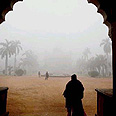
New Delhi, India
צילום: איי אף פי
They just don’t care: Israeli Backpackers in India
What hasn’t already been said about the behavior of Israeli backpackers in India? They’re rude, they’re condescending, and they don’t care. This raises some questions, such as 'Are all Israelis like that?' and more importantly, 'Do they act that way in Israel, too?'
A merry group of Israeli backpackers got onto one of the trains going from the northern vacation cities in the Himalayas to New Delhi, the Indian capital. Their screams and waves of laughter managed to overcome even the din of the train and the air conditioner, and disturbed the other passengers.
The Indian passengers moved uncomfortably and curled up in their seats, or exchanged embarrassed smiles with their fellow passengers.
Until eventually a woman with an educated appearance, wearing traditional Indian garb began to rebuke them in polished English. When she was finished she said, “Do other passengers in your country behave the same way?”
You could understand her question in two ways: One, Is this the way all Israelis behave? or else, a bit less directly, in Israel do “other” passengers — that is, foreigners who are part of a minority group — also permit themselves to behave in such an extreme manner and to violate all local norms? When you think about the behavior of Israelis, the transition from the first question to the second — which at first glance doesn’t seem clear — becomes very logical.
Israelis in Goa: They don’t care (Photo: Avigail Uzi)
When you are the “Other”
As for the first possibility, the Israeli tourist’s behavior is already famous throughout the world. Israel’s embassy in India even recently called on Israeli tourists to behave better and to represent the State of Israel in the best manner possible. As the saying goes, when in Rome, do as the Romans do. There are certain rules of the game and if you don’t adapt yourself to them, it is you who need to change. You are the “Other.”
At the same time of the embassy's call, two articles were published in the Indian press that included a quotation from an Israeli backpacker in Manali: “They (the Indians) are dirty and primitive, but unexpectedly, they serve us well, like the Arabs in the territories did before they decided to raise a hand against us.” This is apparently the way Israelis see the other, which brings us to the second question.
While it’s hard to believe that there’s a tourist who really talks this way in public, there is no question that he gives the essence, in a direct and honest way, of thoughts that pass through the minds of many of the visitors to the sub-continent, whether consciously or unconsciously.
But it isn’t only Israelis who feel these things. These same feelings of superiority are also common among many western visitors to India. In the meeting of eastern and western culture the white man still thinks that he is better, 60 years after the eradication of colonialism in India. Many Israelis are simply more direct and a lot less polite.
The anonymous backpacker quoted in the newspaper teaches us in his own way simple truths about the balance of forces: the other (the Indian or Arab, for our purposes) is inferior and primitive, and his role is simple and functional: he must serve those above him.
Things get complicated when the issue of the balance of forces is more subtle. There is no longer a colonialist in charge and a local under his control, but a group of tourists in a foreign country. The Israelis, by oppressing the locals with their rude behavior, which stemmed from a feeling of superiority, caused the other passengers in the train to be uncomfortable and not to open their mouths.
The “Other” becomes invisible
The gang of Israelis got on the train. They weren't armed with an M-16, nor did they open fire or establish exploitative commercial ties. On the face of it this was not a group that oppresses the “Other.” The reason for this is simple—from its point of view the “Other” doesn’t even exist.
The western tourist wanders around India, marveling at its palaces and rivers. Amazed by its colors, he skips between the villages and the cities in an air-conditioned car, or with a backpack on a tourist bus. “I really like India,” he says, drunk with its smells. But he does not see the residents of this crowded country, or would it be more correct to say, he sees through them?
In this way the Israeli group that got into the intercultural encounter on the train chose not to change its habits, but to ignore the “Other,” not to see him because of what it considers to be his inferiority. The “Other” becomes invisible.
The woman on the train rebelled and set afloat the game of forces that had sunk into the obscurity of secrecy and silence. Do other passengers in your country, who are, like you here, a minority, behave that way in your country? And if they don’t, why do you permit yourselves to do that in India?
That woman, in the passenger train from the Himalayas to New Delhi, in this intercultural encounter taking place in India, wonders which side the “Other” actually is. Do the Israelis, with their condescension, manage to turn the “Other” into a minority here as well?










